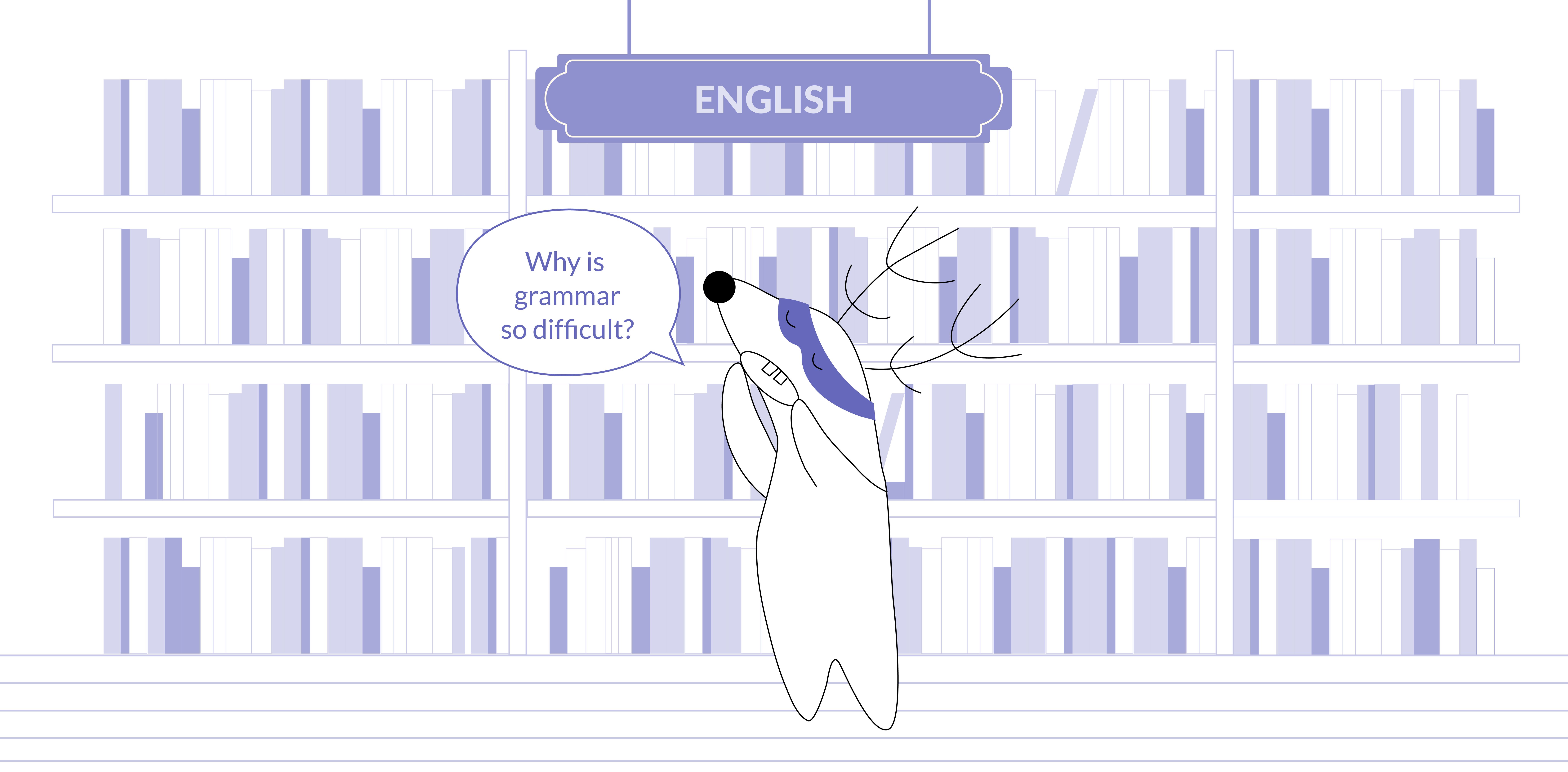
Language proficiency tests are used to test your skills in various foreign languages, such as reading, writing, listening, and speaking. They are used to assess abilities against specific levels of language fluency - for example, the Common European Framework of Reference for Languages (CEFR), which is an international standard for describing language ability.
In some cases, language tests are crucial. They are often necessary when you’re moving to another country, looking for a job abroad, or even applying for a position in a different language. Whether it comes to immigration or career, government agencies will want or need to see your language proficiency test certificate.
Language proficiency testing can often be challenging and stressful and put enormous pressure on the learners. But despite the challenges, it is sure to give you a valuable learning experience as well as provide you with the necessary documents for a life abroad.
Let’s discuss the most important tests for linguistic competence that are used worldwide, including TOEFL, IELTS, TAF, and several others you may need to pass, so that you know what you may need to pass.
We’ll also share some helpful tips regarding preparing for these and all the other language proficiency tests so that you are able to get ready without stressing too much. Read on.
Learn English with Langster
The English Language Proficiency Test - TOEFL
What Is TOEFL?
TOEFL is an abbreviation for Test of English as a Foreign Language. It is designed to assess your proficiency level in understanding and using English, especially in academic settings. Today, it’s one of the most widely-used language proficiency tests worldwide.
Many academic institutions all over the world require foreign students to take it before applying. The more competitive a school is, the higher TOEFL score you’ll need to get in. You may also need to pass the TOEFL exam before applying to an exchange program or for a student visa.
TOEFL Structure
TOEFL consists of four sections: Reading, Listening, Speaking, and Writing. Each section has a different number of questions and time limits that must be adhered to by the test takers. The total time for the whole test is 3-3.5 hours, including a 10-minute break.
- The reading section includes 3 or 4 passages that you must read with 10 questions per passage.
- The listening section contains 4 to 6 different lectures or conversations which you must listen to and then answer the corresponding questions.
- The writing section is divided into two tasks. One requires you to summarize a short passage or an audio lecture, while the other is slightly more independent - you respond to a choice question (for example “do you agree or disagree that…”) and provide arguments why you think so.
- The speaking section is the most complicated out of them all, but it does follow a certain pattern, so you can prepare. It consists of four tasks: two independent ones, where you will be asked to talk about your interests and opinions; and two integrated ones, where you will read or listen to a piece of text and then discuss it.
Taking the TOEFL Test: Formalities
The test is available in two formats: internet-based (TOEFL iBT Home Edition) and paper-based.
The internet-based TOEFL exam is similar to the traditional one, and you can take it at home or at an authorized test center. When taking TOEFL at home, you will need to complete all the requirements. The paper-based TOEFL test may be taken only at approved testing centers.
The price of the test varies depending on the format and your location from $160 to $300.
You get your results approximately 10 days after your test. The internet-based test results should be available just 6 days after taking the exam. TOEFL scores show five proficiency levels: high, intermediate good, fair, limited, and low.
What to Remember When Preparing for TOEFL?
- The main thing you need to be prepared for this English proficiency test is taking notes. You will listen to various audio clips during TOEFL and then will have to speak, write, or answer questions based on them.
These clips will be played just once, which is why you need to take notes in real time and mark down all the important information so that you can use it later. The better your notes are, the better your answers will be.
- For students taking a TOEFL exam for the first time, it may be challenging to read long paragraphs quickly or understand the meaning of some new words based on the context. Because of that, it is extremely important to practice reading and taking in large amounts of information quickly before attempting TOEFL.
- It’s important to remember that TOEFL tests not only your knowledge of grammar and vocabulary, but also your listening comprehension skills. One of the best things you can do to make sure you pass the listening part of the exam is to regularly listen to English podcasts, news, and radio.
This is especially helpful since you practice understanding English speakers via audio recording without any visual cues, just as it will look like during the test. Moreover, mimicking the speaker and repeating what was said can help you boost your speaking skills and improve your English pronunciation.
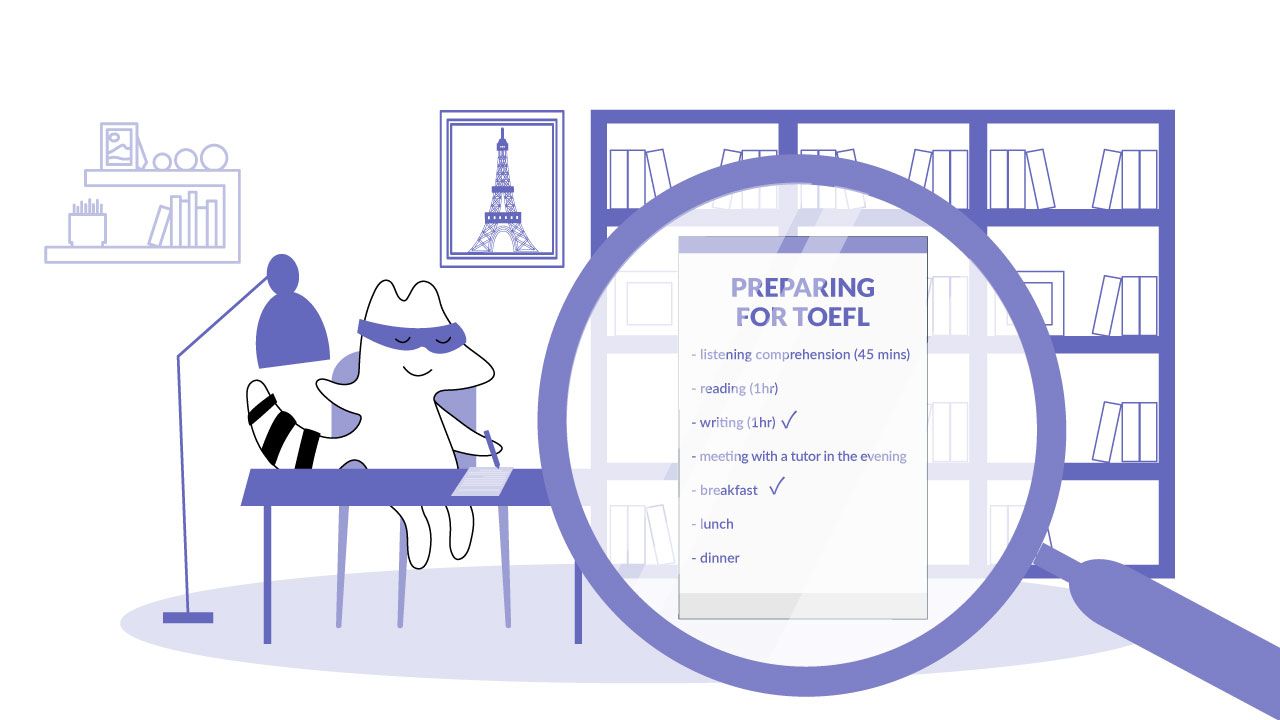
The English Language Proficiency Test - IELTS
What is IELTS?
IELTS is an abbreviation for International English Language Testing System. It is a standardized test of English language proficiency for people who need to study or work in an environment where English is used for communication. This exam assesses the same four skills: listening, reading, writing, and speaking.
While TOEFL is managed by a private non-profit organization (ETS - Educational Testing Service), several organizations are responsible for managing IELTS - the British Council, IDP Education, and Cambridge English Language Assessment. IELTS is one of the major English proficiency tests around the world.
You might be asked to complete this exam to study in a university, move abroad for work or migrate to an English-speaking country like Canada, Australia, New Zealand, the UK, or the USA. While in many countries, different language tests are accepted by the immigration authority, in the UK, IELTS is the English Language Test approved by UK Visas and Immigration (UKVI).
IELTS Structure
The IELTS test is divided into four separate parts: listening (30 minutes), reading (60 minutes), writing (60 minutes), and speaking (11-14 minutes). The reading, writing, and listening parts are done on paper, while the speaking test is a face-to-face interview between the candidate and an examiner.
- The speaking section includes three parts: introduction and interview (you talk about yourself), the long turn (you talk about a certain topic the examiner gives you), and discussion (you and the examiner discuss issues related to the topic).
- In the listening section, you will listen (just once) to four audio recordings and answer 10 questions about each one. Note that different accents are used in the recordings.
- In the reading section, you will read 3 academic texts and answer 40 questions of different types (multiple-choice, true/false, matching information, short answers, etc.)
- The writing section consists of two tasks, and you must complete both of them. For the first one, you need to describe a graph, table, chart, or diagram in your own words. For the second task, you will be given a point of view, an argument, or a problem which you will need to discuss.
For each of the four parts, you will receive a score between 0 and 9. A minimum of 5.5 or 6.5 is usually required when you are applying to a university.
The IELTS test has two versions: Academic (geared for students applying to universities) and General Training (for migrants). These differ in the reading and writing sanctions, where the Academic version is focused on the student’s language proficiency in the academic settings, the the General Training - on the person’s practical, everyday knowledge of English.
Taking the IELTS Test: Formalities
The IELTS fee varies based on your location depending on the format and purpose.
If you take an online test, your results will be ready in about 5-7 days. You will get the results for a paper-based test within 13 days from the date of your test plus delivery.
Test dates are scheduled through appointment only, throughout the year, and in over 1000 locations worldwide. You can book a test online.
What to Remember When Preparing for IELTS?
The preparation for IELTS doesn’t differ a lot from the preparation for the TOEFL. You need to be able to make good notes, work on your listening and reading skills, and try to immerse yourself in the language.
For Academic IELTS, you should also be able to use appropriate English terms when writing. It should help to practice writing on topics that are common on IELTS.
The French Language Proficiency Tests - DALF and DELF
What are DALF and DELF?
DALF (Diplôme Approfondi de Français Langue Étrangère, or Advanced Diploma in French Language) and DELF (Diplôme d'Études en Français Langue Étrangère, or Diploma of French-Language Studies) are tests of French language proficiency developed by the Centre International D’études Pédagogiques (CIEP).
These are the only French as a foreign language diplomas issued by the French Ministry of Education.
These diplomas are intended for students who have studied French in school/university and must prove their professional knowledge of French. If you want to study, work or immigrate to a French-speaking country, you might need to pass one of these tests.
DELF
DELF covers the first four levels of the CEFR: A1-B2. Depending on the reason you are taking the exam, you need to pass a different DELF exam. Each exam tests you in four different areas: reading, writing, listening, and speaking. The higher the level of the exam, the longer it will take (DELF A1 - 1h 20 min, DELF B2 - 2h 30 min).
To pass the exam on any level, you must get a score of 50/100, with a minimum of 5/25 in each area.
DALF
Unlike DELF, DALF covers only two levels of the CERF: C1 and C2. If you want to study in France or in French, you will need to pass this exam (usually C1). The DALF diploma is also often required in large companies where employees are expected to be fluent in French.
DALF also consists of four parts and tests you on reading, listening, writing, and speaking. To pass the exam, you need to score 50/100 with a minimum of 5/25 in each part.
How to Prepare for DALF and DELF?
As you can see above, the DALF and DELF are detailed exams that test your knowledge of French beyond the level of regular conversation. To prepare for these tests, it is important to study not only your vocabulary and grammar, but learn how to talk to a native speaker in formal situations and get used to French pronunciation.
What’s more, since each exam is different from the other, make sure to research each one and take and prepare for the format.
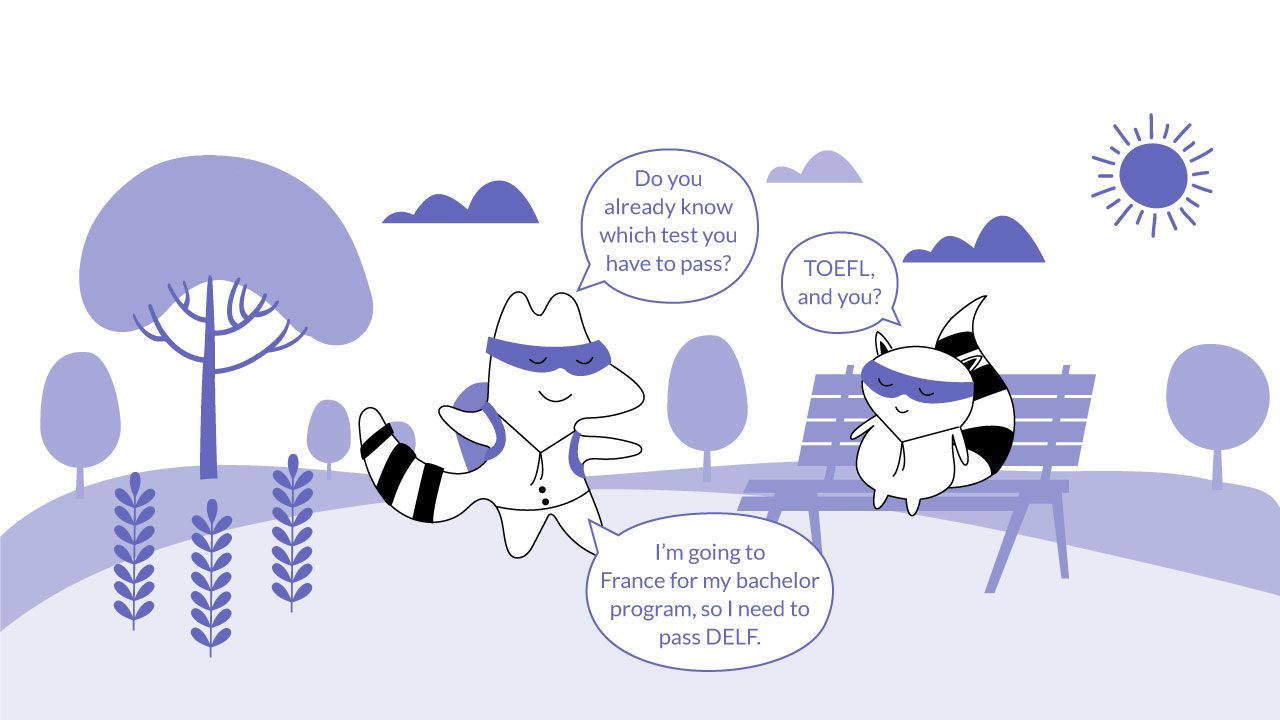
The French Language Proficiency Test - TCF
What is TCF?
TCF stands for Test de Connaissance du Français (Test of French Knowledge). It is an official state examination that tests your oral and written skills in French and is administered by Centre International d’études Pédagogiques (CIEP) or the French Ministry of Education.
This test is often used to assess the level of French of non-French speakers for professional or academic purposes - for example, studying in a French university. You also need to pass it when seeking permanent residence in France or Canada.
TCF Structure
This test is a little more complicated than the ones we mentioned before. It consists of two parts: Compulsory and Optional. The compulsory test has three subsections: listening, use of language structures, and reading comprehension.
- The listening section consists of a test with multiple-choice questions that are based on a video recording. This tests your ability to understand common expressions and words.
- The use of language structures section includes a written test that checks your grammar knowledge and vocabulary in complex sentences.
- The reading part requires you to analyze the article and answer questions based on it.
The Optional Test consists of two parts - speaking and writing. You can take these once you’ve passed the Compulsory Test - directly after or during two years after (this is how long your score is valid).
- During the speaking section, you will have a one-on-one interview with an examiner. It lasts 12 minutes and the examiner can ask you questions about your life, plans, interests, etc. The questions start at the A1 level and go to C2 level.
- The written part lasts 60 minutes and consists of three writing tasks - a small message of no more than 120 words, a small message/letter/note of 150 words, and two opinion pieces of 180 words each.
The compulsory exam takes 85 minutes and the optional - 72 minutes. The cost varies depending on the tests you take from $230 to $460. The fee may be higher depending on the exam center you’re taking the test in.
TCF is offered in more than 600 exam centers worldwide.
What to Remember When Preparing for TCF?
When preparing for taking the TCF exam, it can be helpful to hire a tutor who has experience in helping people pass the exam. A regular French tutor will also be a good step if you know already what exactly you need to work on.
There are also many free online resources that can help you prepare for TCF. When looking for them, make sure the materials are up-to-date and have good reviews.
The German Language Proficiency Test - TestDaF
What Is TestDaF?
TestDaF is an abbreviation for Test Deutsch als Fremdsprache. It is designed to assess your ability in German and is run by the independent TestDaF-Institut. It is also supported by the German Rectors’ Conference (Hochschulrektorenkonferenz), German Academic Exchange Service, and the Goethe-Institut.
You might need to take this test if you want to study or work in a German university. All German universities recognize the TestDaF certificate, so if you need to take a German language proficiency test for academic purposes, TestDaF will be enough.
TestDaF Structure
The exam consists of four sections: reading, listening, speaking, and writing. The total time for the whole test is 3 hours and 10 minutes, not including the breaks.
- The reading part consists of 30 questions based on 3 texts of different levels.
- The listening part includes listening to 3 audio recordings and answering 25 questions.
- For the writing part, you have to complete one written task - describe statistical data (usually a graph or a table) and then answer a question related to this data.
- The oral part requires you to complete 7 different tasks to prove your ability to speak German in different situations related to the field of higher education.
The test is graded using 3 levels of language knowledge - TestDaF-Niveaustufe 3 (TDN 3), TestDaF-Niveaustufe 4 (TDN 4), and TestDaF-Niveaustufe 5 (TDN 5). TDN 3 and the lower half of TDN 4 correspond to the B2 level, and the upper half of TDN 4 and TDN 5 - to C1.
You can take the TestDaF in 450 test centers in 95 countries worldwide, usually local German and foreign universities, DAAD editorial offices, and Goethe-Institut. The fee varies depending on the country.
How to Prepare for TestDaF?
There are many online materials, sample tests, and tips for the examination available on the official website of TestDaF. There you can also take a placement test before taking the exam.
If you want some help during your preparation for the test, you can enroll in a TestDaF preparation course offered by official test centers or language schools - these are available both in Germany and in many foreign countries. You can find a list of such places on the website as well.
The Spanish Language Proficiency Test - DELE
What is DELE?
DELE, Diplomas de Español como Lengua Extranjera are diplomas issued to non-Spanish speakers who pass the test administered by Instituto Cervantes on behalf of the Spanish Ministry of Education and Science.
DELE is recognized by many educational and business institutions all over the world, so you may need to get it to study in Spanish or apply to certain positions where a good knowledge of Spanish is required.
DELE Structure and Formalities
The structure of the test varies depending on the level you’re taking it in: A1 to C2. Nevertheless, each variant of the exam tests your reading, speaking, listening, and writing skills. DELE focuses on your ability to use grammar and comprehend the Spanish language.
You need to research which diploma is required by the institution you’re applying to before taking the test. B2 is usually enough for most Spanish universities, and C1 is required for medical studies.
The results are published three months after the examination, upon the approval of grades by the University of Salamanca. You need to pass each part of the exam to pass the entire test.
DELE can be taken in more than 800 centers in over 100 countries. The fee for the test varies depending on the level and location of the test.
What to Remember When Preparing for DELE?
The questions on the test vary depending on the level. For example, DELE A1 checks your ability to use Spanish in basic situations, such as common everyday tasks, while C1 tests if you have sufficient linguistic competence in Spanish, can express yourself fluently and spontaneously, and are able to understand a wide range of information.
Apart from boosting your skills and working on your Spanish knowledge, you can obtain the sample tests and audio materials on the official DELE page to prepare in the most effective way.
The European Language Certificates - telc
What Is telc?
telc language tests, or the European Language Certificates, are a number of language exams available in 10 languages: English, German, Turkish, Spanish, French, Italian, Portuguese, Russian, Polish, and Arabic. Just like DELF and DALF, you can choose the level of the test you want to take - from A1 to B2 or C2 (depending on the language).
The European language certificates are recognized in many countries. telc - Deutsch is managed in partnership with the German federal government.
If you want to apply for a German residency permit or citizenship, you need to take this test. For example, for a German visa concerning the subsequent immigration of a spouse, an applicant has to pass the telc A1 exam.
The telc exams are also accepted in many universities worldwide, as well as used for proof of language knowledge in the context of professional recognition.
telc Structure
The exam consists of four sections (reading, writing, listening, and speaking), and two parts.
- The written part includes reading comprehension, language elements (that test your grammar and vocabulary), listening, and writing.
- The oral part consists of a presentation (where you present something briefly to your partner), a discussion on a controversial topic, and carrying out a given task.
Taking the telc test: Formalities
telc is a standardized test that can be taken at one of the 3,000 testing centers worldwide. Test results are available after four to six weeks and are valid for an unlimited period.
The fees for taking the test vary on the language and level. Check the price for the exam you want to take in your local testing center or online.
What to Remember When Preparing for telc?
The best way of preparing for telc is by boosting your CERF level and taking mock exams to familiarize yourself with the test structure. Don’t focus just on the things you may have to deal with on the test - work on your grammar, vocabulary, speaking and listening skills and try to improve your knowledge of the foreign language.
To make sure you’re as ready as you can only be, you may also download free tips for the test takers on the official telc website. These can help you stay sharp when studying.
The Chinese Language Proficiency Test - HSK
What is HSK?
HSK is an abbreviation for the Chinese Proficiency Test (Hànyǔ Shuǐpíng Kǎoshì) and it is the only standardized test for Mandarin Chinese. It is managed by an agency of the Ministry of Education of the People's Republic of China called Hanban.
You need to take HSK if you want to study in a Chinese University or work for a Chinese company. Different levels of the test (from 1 to 6) can be required by different institutions.
HSK Structure
HSK test takers are divided into three stages (beginner, intermediate, and advanced) and levels from 1 to 9, where HSK1 is designed for learners who know some simple Chinese characters and can create basic sentences, while HSK9 is used for learners who can fluently and smoothly communicate in Chinese.
The test focuses on testing your knowledge of Chinese syllables, characters, words, and grammar. The basic levels (1-3) test from 500 to 2245 words, the intermediate levels (4-6) from 3245 to 5456 words, and the advanced levels - from about 6000 to 11000 words.
The difficulty of the materials you get through the test also varies depending on the level. Beginners will get some very simple materials to prove that they can understand and communicate on simple topics in Chinese.
Intermediate learners will get slightly modified authentic materials or authentic materials written/spoken in a clear manner that are used by educated native speakers. These can include simple articles, simple commentaries from magazines and newspapers, etc.
Advanced learners will get longer, more complicated and abstract materials, such as excerpts from Chinese university textbooks, extracts from modern Chinese literature, interviews from the media, etc. Some materials concerning Classical Chinese are also included in this level.
The HSK test can be taken in designated test centers in China and abroad - you can find a list of them on the official website. Results are available around 30 days after taking the test. The fees vary depending on the level and location where you’ll be taking the test.
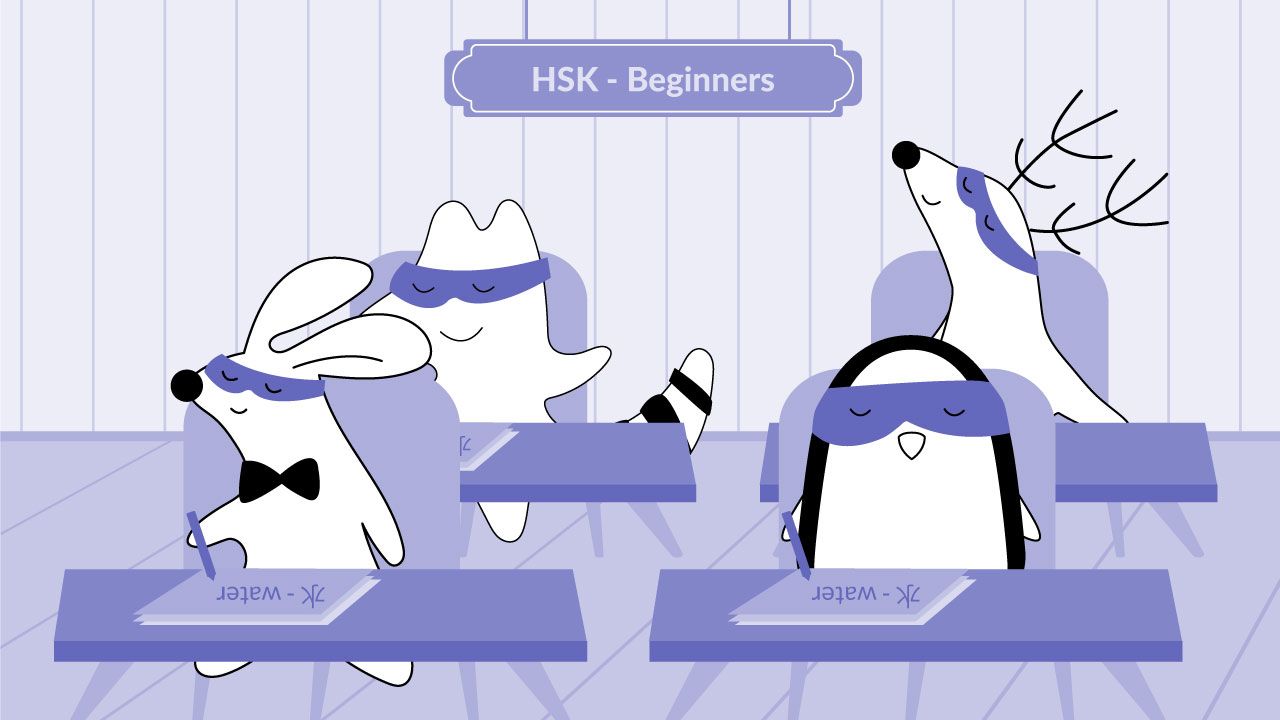
What to Remember When Preparing for HSK?
Vocabulary and grammar are the key to HSK and the foundation of your knowledge, which is why you should focus on them as much as possible. Check the vocabulary lists online according to your level and drill them. You can use flashcards or other methods designed specifically for increasing your vocabulary.
Listening is another thing. The Chinese language is especially hard to understand if you don’t have any prior experience hearing a tonal language - so work on your listening skills as much as possible during the preparation. Practice finding the key words and happenings in the materials you’re listening to; this will help you greatly on the exam.
To prepare for the HSK most effectively and do everything to pass it, you can also attend a coaching class or do mock-up exams online.
The Japanese Language Proficiency Test - JLPT
What Is the JLPT?
The Japanese Language Proficiency Test (JLPT) is a standardized test of Japanese language proficiency for non-native speakers. It is administered by Japan’s Ministry of Education, Culture, Sports, Science and Technology.
You may need to take the JLPT to immigrate to Japan, study, or work there. Some companies that hire employers with Japanese may require applicants to take this test.
JLPT Structure
There are currently five JLPT levels: N1 to N5, where N1 is the highest, and N5 - the lowest.
The JLPT is held only two times a year in July and December in Japan and overseas. Unlike other language tests, you can’t retake it every few months.
The format of the JLPT has been revised several times. The current test format was introduced in 2010. Now, there are only two parts for each level: language knowledge (divided into vocabulary, grammar, and reading) and listening. Levels N5 to N3 also have reading as a separate section.
To pass the test, you need to pass each section individually and achieve an overall pass mark. The minimum pass marks for each section are 19/60 (or 38/120 for the language knowledge section on the N4 and N5). The overall pass marks vary from 100/180 on the N1 and 80/180 on the N5.
The fee for the test varies depending on the level and location.
What to Remember When Preparing for the JLPT?
To successfully prepare for the JLPT, it is important to know what it expects from you. In the first place, JLPT needs you to focus on understanding speech and expressing yourself in Japanese, and only then show that you’ve mastered grammar structures.
Because of that, it’s important to focus on the practical side of the language when preparing. While with IELTS or other similar proficiency tests, you might have looked for mock exams and example questions, here, try to boost your knowledge as much as possible - and make sure that your Japanese usage is great.
Preparing for Any Language Proficiency Test: Key Steps
Each language proficiency test differs from another; but regardless of that, there are several common steps that all can help you prepare well and ace your exam - whether it’s the IELTS, DELF, JLPT, or any other tests.
1. Learn everything about the test.
You may know the foreign language at a great level, but language proficiency tests are not always about daily, regular language use. Often their structure is directed at checking someone’s academic level of a certain language, which often means that without preparation, even native speakers can not reach the desired score.
Learn everything about what’s on the test and what it requires from you - what kind of vocabulary, grammar knowledge, and speaking skills. This will significantly boost your chances of passing.
2. Check your language level.
Whatever the reason you are taking the test, you need to be able to estimate your score. Universities, immigrations services and job positions require different skills and different tests - for example, a B1 might be enough to move to the UK, but application to an Ivy League university will require much more from you.
Also, unlike IELTS or TOEFL, where you will pass regardless of the score, many language tests have different variants for different language levels. To pass them, your language skills need to be on a certain level - so you should know where you are now and where you want to get.
3. Look for test-specific materials.
Each language test has different exercises - and while in some, you may deal only with multiple-choice questions, as in TCF listening, or no writing tasks, as JLPT, others will have many types of questions and several writing tasks on different topics, as, for example, TOEFL.
Because of that, it’s important to get prepared for the specific tasks and exercises that you will encounter on the test. Many official websites have free preparation materials for the test-takers, as well as example questions and even practice tests. You can also find many materials specific for each test online.
Use these to prepare for the test - this will help you get familiar with the structure and type of tasks, as well as focus only on the necessary exercises.
4. Practice each skill and take mock exams.
Language tests usually check the four major skills - reading, writing, listening, and speaking. Even if you are very good in some of them but not great at others you might not pass or get the necessary score. This is why working on all the language skills when preparing for the test is a must.
Listen to podcasts and audio recordings, practice reading and making notes, learn academic vocabulary and writing structures, and work on your pronunciation and intonations.
Learning together with someone or hiring a private language tutor may be especially beneficial for this, as another person can point out what you need to improve and help you with that. You can also use language-learning apps such as Langster to stay motivated and have some fun while learning.
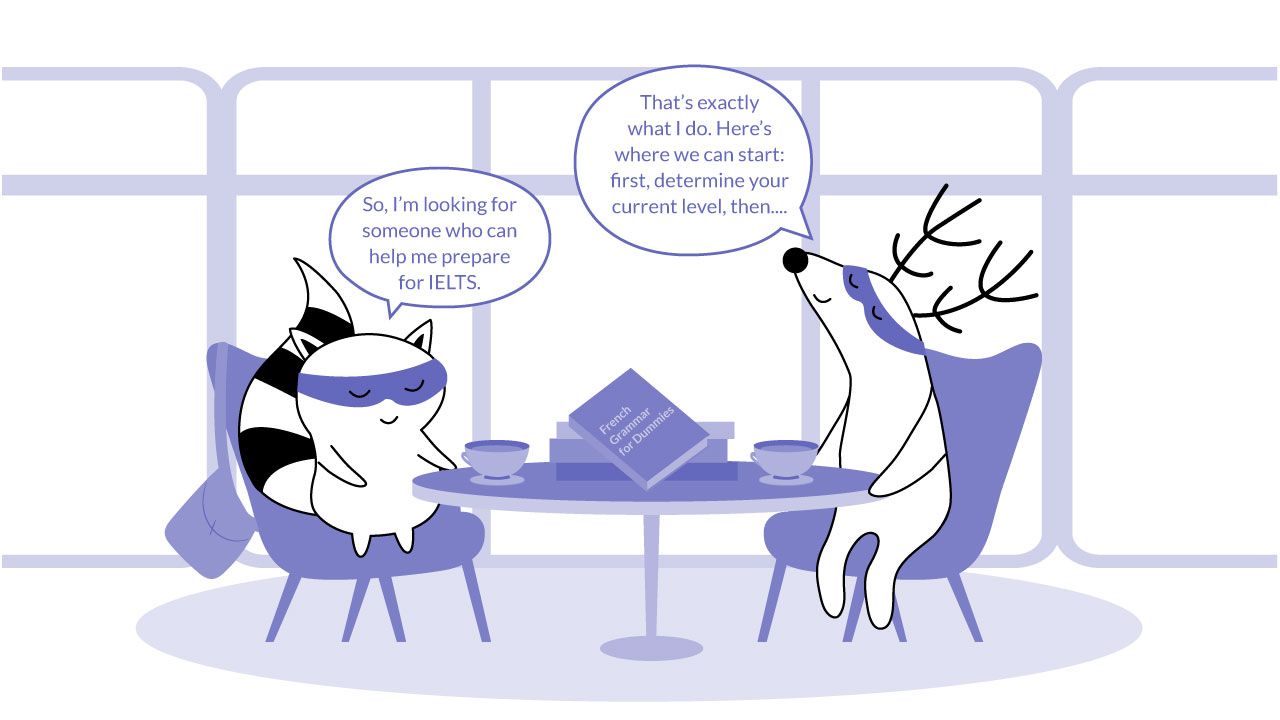
Final Thoughts
These are just some of the language proficiency tests around the world - and of course, there are a lot more of them for all kinds of languages. As you have just learned, many language tests are similar in the way they test your skills and the amount of preparation they require.
The key here is to remember that a language test is just a tool with a specific aim. If you need it to move to another country or study in a foreign university, you will need to work on the specific skills it tests. Language schools, private tutors, and online materials can help with that - and very often, the more strategies to beat the test you look at, the bigger are your chances of passing it.
However, remember that language tests don’t always reflect your knowledge - so apart from preparing specifically from one of them, try to immerse yourself in the language as it is used by native speakers. Also, try to look for interesting learning materials that don’t only help you prepare but also keep your motivation up. Remember - learning can be fun if you have the right tools.







